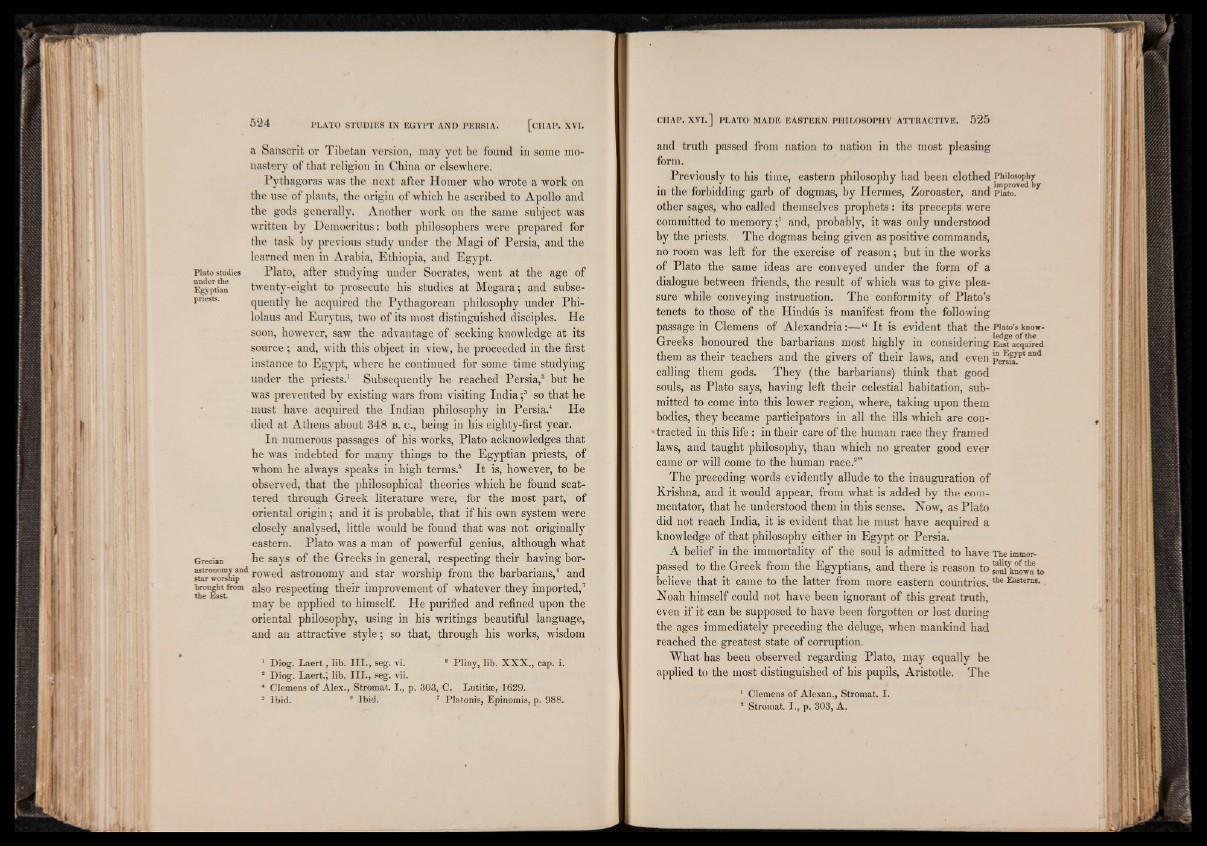
Plato studies
under the
Egyptian
priests.
a Sanscrit or Tibetan version, may yet be found in some monastery
of that religion in China or elsewhere.
Pythagoras was the next after Homer who wrote a work on
the use of plants, the origin of which he ascribed to Apollo and
the gods generally. Another work on the same subject was
written by Democritus: both philosophers were prepared for
the task by previous study under the Magi of Persia, and the
learned men in Arabia, Ethiopia, and Egypt.
Plato, after studying under Socrates, went at the age of
twenty-eight to prosecute his studies at Megara; and subsequently
he acquired the Pythagorean philosophy under Phi-
lolaus and Eurytus, two of its most distinguished disciples. He
soon, however, saw the advantage of seeking knowledge at its
source; and, with this object in view, he proceeded in the first
instance to Egypt, where he continued for some time studying
under the priests.1 Subsequently he reached Persia,2 but he
was prevented by existing wars irom visiting India ;3 so that he
must have acquired the Indian philosophy in Persia.4 He
died at Athens about 348 b . c ., being in his eighty-first year.
In numerous passages of his works, Plato acknowledges that
he was indebted for many things to the Egyptian priests, of
whom he always speaks in high terms.5 It is, however, to be
observed, that the philosophical theories which he found scattered
through Greek literature were, for the most part, of
oriental origin; and it is probable, that if his own system were
closely analysed, little would be found that was not originally
eastern. Plato was a man of powerful genius, although what
Grecian he says of the Greeks in general, respecting their having bor-
Sr°woShipDd rowed astronomy and star worship from the barbarians,6 and
also respecting their improvement of whatever they imported,7
may be applied to himself. He purified and refined upon the
oriental philosophy, using in his writings beautiful language,
and an attractive style; so that, through his works, wisdom
1 Diog. Laert., lib. I I I . , seg. vi. * Pliny, lib. X X X ., cap. i.
* Diog. Laert.; lib. I I I . , seg. vii.
* Clemens of A lex., Stromat. I., p. 303, C. Lutiti®, 1629.
s Ibid. * Ibid. 7 Platonis, Epinomis, p. 988.
and truth passed from nation to nation in the most pleasing
form.
Previously to his time, eastern philosophy had been clothed Philosophy
in the forbidding garb of dogmas, by Hermes, Zoroaster, and piato.
other sages, who called themselves prophets : its precepts were
committed to memoryand, probably, it was only understood
by the priests. The dogmas being given as positive commands,
no room was left for the exercise of reason; but in the works
of Plato the same ideas are conveyed under the form of a
dialogue between friends, the result of which was to give pleasure
while conveying instruction. The conformity of Plato’s
tenets to those of the Hindus is manifest from the following
passage in Clemens of Alexandria:—“ It is evident that the Plato’s know-
Greeks honoured the barbarians most highly in considering Eastaeqoired
them as their teachers and the givers of their laws, and even pe®^pt 2114
calling them gods. They (the barbarians) think that good
souls, as Plato says, having left their celestial habitation, submitted
to come into this lower region, where, taking upon them
bodies, they became participators in all the ills which are con-
♦tracted in this life : in their care of the human race they framed
laws, and taught philosophy, than which no greater good ever
came or will come to the human race.2”
The preceding words evidently allude to the inauguration of
Krishna, and it would appear, from what is added by the commentator,
that he understood them in this sense. How, as Plato
did not reach India, it is evident that he must have acquired a
knowledge of that philosophy either in Egypt or Persia.
A belief in the immortality of the soul is admitted to have The immor-
passed to the Greek from the Egyptians, and there is reason to Sai^knowa to
believe that it came to the latter from more eastern countries.the ,
Noah himself could not have been ignorant of this great truth,
even if it can be supposed to have been forgotten or lost during
the ages immediately preceding the deluge, when mankind had
reached the greatest state of corruption.
What has been observed regarding Plato, may equally be
applied to the most distinguished of his pupils, Aristotle. The
1 Clemens of Alexan., Stromat. I.
! Stromat. I ., o. 303. A.